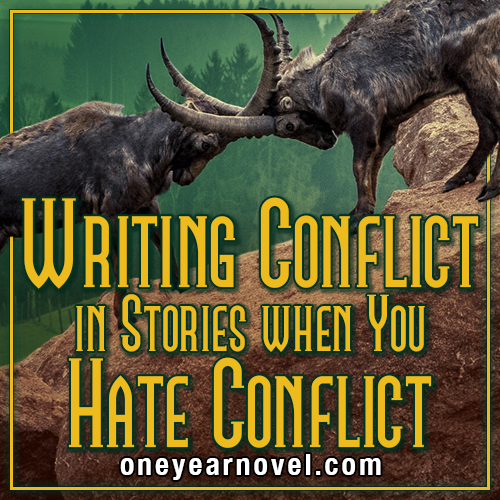Writing Conflict in Stories When You Hate Conflict
 A writer contemplates the meaning of conflict in stories and the gospel vs. conflict along classic “Hero’s Journey” lines
A writer contemplates the meaning of conflict in stories and the gospel vs. conflict along classic “Hero’s Journey” lines
By Courtney Kleefeld, student contributor
Most people don’t like getting out of their comfort zones. That usually means they don’t like conflict. Conflict, specifically with other people, can cause a sensitive person like me a lot of stress. Anxiety about conflict is not good for one’s health. Some novels, entertainment, social media, and people, whether well-intentioned or not, may not be healthy for people already dealing with uncontrollable depression and anxiety. And when I think of the word conflict, I usually think of arguments between people. So why should I write something I don’t even like reading about in fiction?
Here are some things I have learned that have helped me understand the reason for conflict in stories.
First, I remind myself that conflict isn’t always a fight to the death. When I expand the definition of conflict, I see that there’s conflict in every story you can think of, even the slower stories like Pride and Prejudice and Jane Eyre. There’s even conflict in the book of Ruth.
Sometimes conflict is just a hint of foreshadowing of a disagreement.
Sometimes it’s unrelated to the main story goal but just on the level of a scene, like birds stealing a character’s meal or a silly disagreement between friends over which actor played someone in a movie.
Indecisiveness creates conflict too. Many people give up on their dreams because they can’t stand the uncomfortable-ness of the “not yet” or the “what if this doesn’t happen?” or “what if this doesn’t matter?” Conflict is a part of life. It exists because people are always changing, moving, making the same decision as before or making a new decision that throws everything off balance.
I don’t think you should have an argument or explosion in every scene just to make sure there’s some sort of conflict in your scene. Conflict that is not organic to the story can come across as forced and cause more harm than good.
This is the second insight about conflict that has helped me to see it in a new light: my inclination to lower tension in my stories is a necessary counterweight. It’s actually good to have some slower reaction scenes in your story, especially after a huge event. Reaction scenes are where the characters process what has happened. Many adventure stories suffer because the characters are never given the opportunity to reflect on the impact of their actions or the actions of others. Writing a slower reaction scene after many fast-paced ones helps you, as a reader, take a deep breath and rest.
Third, I remember that conflict is crucial in stories because the way the characters deal with it says something about what the characters value, how strongly they value it, and whether or not it is strong enough to defeat the antagonist. It captures your attention and asks you to make a judgment.
When I think about this, though, I am sometimes uneasy. I believe in writing meaningful, artful stories—stories that don’t beat readers over the head with a message. Doesn’t setting up conflict structure stories in such a way as to force an answer about right and wrong onto the reader? Doesn’t that suggest a hidden agenda, a message-driven story, or in an extreme case, obvious preachiness?
I think about the stories Jesus told. In the story of the Prodigal Son, there is no antagonist except the mistakes of the son. The older brother isn’t the better person, and the story ends with a question. Lots of Jesus’ stories end with questions. Many times the truth inside them is hard to figure out upon the first or fifth read. I think sometimes this is so that we will desire the truth more and seek it out even more and value it more. Jesus explains the meaning of his stories, but only to his close disciples.
Some of you will be familiar with Joseph Campbell‘s The Hero With a Thousand Faces, about the Hero’s Journey—a kind of story template. The gospel story itself is like the Hero’s Journey in that Jesus comes to earth to ransom us, overcomes temptations, is trained for ministry, and then blows everyone’s minds by his actions and changes the world. It is very different from the typical Hero’s Journey story yet the epitome of it at the same time in that Jesus didn’t kill anyone on earth but let people kill him, thus the dark moment, and then he defeated Death itself and came back to life. Then there is mystery. Mystery after mystery. Who will see him first? Who will tell the others? Will they believe them? What will happen now?
The gospel is the ultimate reason that the Hero’s Journey works and is a valid form of story—and this encourages me because the gospel includes conflict and truth without being obvious or preachy. Having truth in your story is not the same thing as being preachy, but the way you reveal the truth will show your own relationship with it to some degree.
This fourth insight is truly freeing: Carefully engineered conflict is not the only or primary way to say something meaningful in a story.
In a way, beauty is a form of truth. Truth doesn’t always have to be dressed up in factual clothing like a business man trying to sell you something. Sometimes it can dress up like a waterfall. A child playing a game. An old man giving his last words. When I observe my favorite books, I find that my favorite scenes in stories have to do more with mystery and discovery, introduction of intriguing concepts, and the fulfillment of them, than an action scene.
Finally, I want to add that sometimes I have trouble writing conflict because, in the back of my head, I wonder “Will this really matter to the reader?” and “Will this annoy the reader?” Worrying about this often causes me to make the scene less dramatic and less passionate. This may sometimes be good, but it might not be good in other cases. An unmotivated main character makes for a hard-to-write book, let me tell you. And not being motivated comes from either not valuing something enough at the moment, not having energy, or just plain depression.
I’ve had trouble valuing my own desires because of the thoughts, “What if they don’t matter to anyone but me?” and “What I want doesn’t matter.” But that’s contributed to my self-withdrawal from life and kills my motivation to write. I have to tell myself, “What I want matters to God because He loves me and put that in me. So I should value it too and be patient.”
You have to let your characters value things that you may not value so much at the moment, and you have to value their desires because their desires will create suspense.
As a famous quote puts it, “No tear in the writer, no tear in the reader.”
Good writers (many “OYANers” included, I have found) are adventurers, not because of the fact that they write anything, but because they are brave and bold enough to highly value things that some will not value.
When we let ourselves feel what our characters are feeling, when we let ourselves be realistic, even when it’s painful, when we get to a seemingly lonely place that feels like the place no one has ever gone before, we soon find that someone else has been there too and values the fact that you have been there. A little less lonely. We don’t do this just because we can, but because it helps us confront our problems that we’ve ignored for too long. They pop up in our stories without us meaning to put them there. The question is, will you let it stay in the story and build it up and work through it with patience with the character, or will you hide it yet again and pretend it’s not there?
Good writers are willing to be vulnerable.
The important thing about writing stories at all is your own discovery of truth, beauty, and mystery. Conflict has a role to play in your journey of discovery. In the mystery, you will find a glimpse of the Creator. “In the beginning, God created the heavens and the earth,” isn’t just the beginning of the Bible. It’s the beginning of creativity itself. You were made in the image of a creative God, which means that when you are making something, you are reflecting the one who made you and loves you. His love makes it safe to explore conflict in our stories, even when it’s uncomfortable.
…
Have you ever struggled to incorporate conflict into your stories? How did you get better at it?
…
Courtney Kleefeld is currently a Sophomore studying at Oral Roberts University with a major in writing and a concentration in Literature. In the time spent procrastinating, she can be found either playing harp for small audiences in her dorm, recommending Auralia’s Colors to anyone who likes to read, or brainstorming and world-building for a book series she has been working on for nine years and counting.



